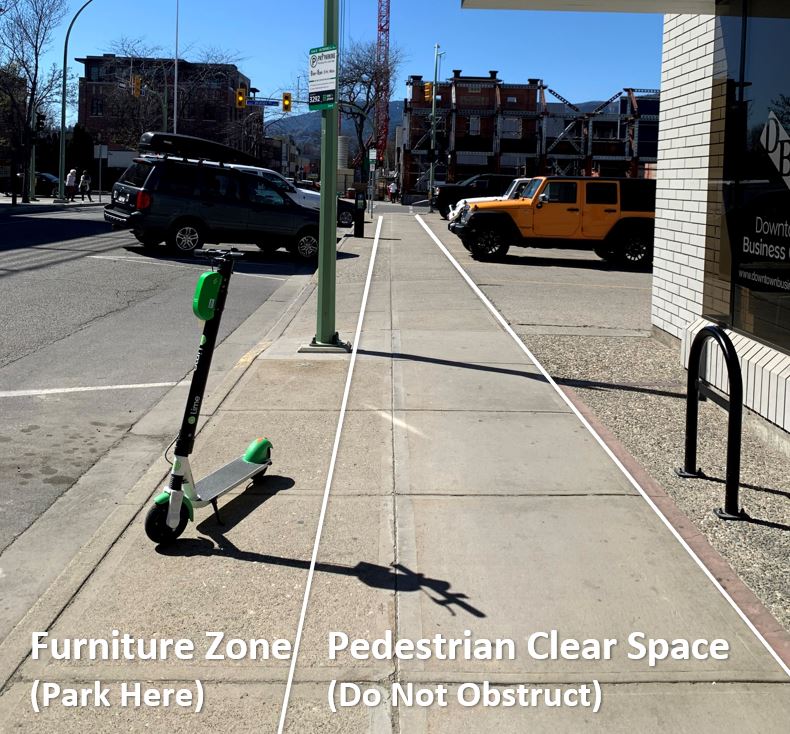Shared bikes and e-scooters
Kelowna is one of eight communities participating in the provincial e-scooter pilot. E-scooters can be ridden on city streets under the same rules as bicycles.
Shared or rental e-scooters and e-bikes are regulated through the City’s Micromobility Permit.
Micromobility is reducing congestion and emissions by giving residents and visitors an alternative to driving for short trips. As of spring 2025, shared micromobility devices in Kelowna have covered over 3 million kilometers and facilitated 1.5 million trips since their introduction in April 2021.
We're closely monitoring the program and will continue looking for ways to integrate this new way of getting around our community.
Contact the operator
| Operator | Phone number | |
| Lime | 1-888-546-3345 | [email protected] |
Submit a service request
Submit a service request
If you see someone riding an e-scooter improperly (e.g. without a helmet, on the sidewalk, doubling up, intoxicated, or under 16 years of age) - submit a service request. Please include a photo, location, and time.
Unsafe or intoxicated riding can also be reported directly to law enforcement.
E-scooters can be ridden in Kelowna under the same rules as bikes. This means no riding on the sidewalk. Stick to the streets, bike lanes, and multi-use pathways.
E-scooters cannot be ridden in City Park and along the downtown waterfront. They also cannot be ridden downtown after 10:30 pm.
Check the operator's app for more information on service areas.

Do:
- Park in the 'furniture zone,' in line with bike racks, benches, street trees and garbage bins.
- Consider seniors and people with disabilities, including people with limited vision or using wheelchairs
- You can park on the side of the road in places without paid parking
Don't:
- Block sidewalks, doorways, or driveways
- Block accessible parking spots and entryways
- Block people from using the front or rear doors of the bus at transit stops
- Block paid parking spots
E-scooters and e-bikes are not toys. You must scan a government ID to verify you are over 18 when setting up an account.
It’s against the law, and you could hurt yourself or others.
It’s the law and reduces injuries. Take a selfie wearing one before your ride for a discount.
Only one person per e-scooter.
The Lime Access program offers a 70 per cent discount for people with the BC Bus Pass, Senior’s Supplement, or in the BC Income Assistance Program.
The Micromobility Permit Program is self-funding. There is no taxation associated with the program. Operators pay an annual permit fee to offset costs related to managing the City tasks associated with the program.
The City is working with Interior Health to monitor emergency room visits related to e-scooters. Between April 2021 and September 2022, 108 injuries were identified out of 453,000 trips.
After a spike in the first two months, the injury rate for e-scooters was similar to the estimated rate for bicycles.
There was a 30 per cent reduction in confirmed e-scooter injuries in 2022 compared to 2021.
Operators share a live feed of their devices’ location and status with the City. This is used to monitor compliance with things like the fleet cap or no-ride zones.
Riders are provided with safety information and requirements through multiple channels, including in-app messages and rules printed on the vehicles.
E-scooters are also required to have technology to detect when they’re being ridden on sidewalks and deliver audible warnings to riders, reminding them to stay off the sidewalk.
Riders need to take a photo of how they parked to end their trip. The operator reviews these photos and issues warnings and fines for improper parking.
The Micromobility Permit includes a mechanism for random parking audits. Operators who do not meet the 97% standard can be fined and have their fleet size reduced until they reach compliance



